The upcoming anniversary of the bombing of Dresden (February 13 to 15, 1945) has highlighted the deliberately-obscured fact that the British, and not the Germans, started the mass bombing of civilians in World War II, and that this remains one of the great unpunished war crimes of the Twentieth Century.
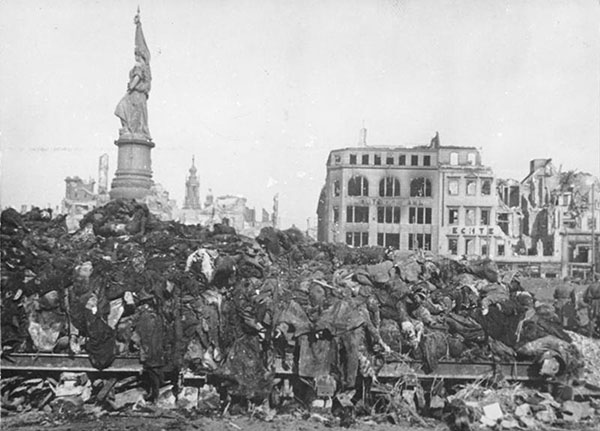
A funeral pyre in Dresden, February 1945.
As part of a general post-World War II propaganda campaign to paint the Germans in as bad a light as possible, the controlled media has always claimed that the Germans started the bombing of civilians, using the two examples of the Luftwaffe attack on Warsaw, Poland, in September 1939 and the May 14, 1940 bombing of Rotterdam, the Netherlands.
The propaganda story goes along the lines that the Germans bombed these cities and thereby set the example of the mass bombing of civilians—and then followed this up with the “blitz” on London.
Only after all this, it is claimed, did the Germans “get back” what they had dished out.
This myth has been stated over and over so many times by the controlled media that it has become the “popular” understanding of the course of the war.
The reality, like so much else about World War II, is completely the opposite.
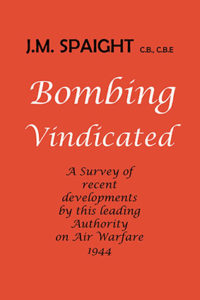 In 1944, public discontent in Britain over the RAF’s civilian bombing policy had reached record heights, and to counteract this dissent, the former British Principal Secretary of the Air Ministry, J.M. Spaight, published a book titled Bombing Vindicated, which set out to justify the saturation bombing of German civilians.
In 1944, public discontent in Britain over the RAF’s civilian bombing policy had reached record heights, and to counteract this dissent, the former British Principal Secretary of the Air Ministry, J.M. Spaight, published a book titled Bombing Vindicated, which set out to justify the saturation bombing of German civilians.
The Bombing of Warsaw
Spaight was honest in his book about the origins of the civilian bombing, and openly admitted that the Warsaw and Rotterdam bombings could not be compared to the RAF’s tactics, saying: “When Warsaw and Rotterdam were bombed, German armies were at their gates. The air bombardment was an operation of the tactical offensive.”
In other words, the bombing of Warsaw took place as part of a set tactical battle. The German army had laid siege to the city on September 16, 1939, and the Polish bravely—and fiercely—resisted until September 27, turning the city into an effective fortress which the Germans battled to subdue.
The Luftwaffe attack was therefore, part of the established rules of conflict and not a saturation bombing of civilians.
The Bombing of Rotterdam
The Rotterdam bombing was an identical scenario: German paratroopers had in fact been defeated in their May 10, 1940 attempt to seize the city of The Hague—a victory by a brave Dutch army which has also passed unnoticed, ignored by the Anglo-Saxon mass media—and it was up to German ground forces to press home the invasion.
Dutch resistance elsewhere was also far stronger than the Germans had anticipated, and an attempt by the German army to seize the 20 mile (32 kilometer)-long Afsluitdijk in the north of Holland was also defeated in a two-day long battle from May 12–14, 1940. The fierce Dutch resistance was beginning to hold up the entire German plan.
By May 13, the German army had reached Rotterdam, but once again Dutch military resistance halted the advance.
The Dutch defenders, under the able command of Colonel Pieter Scharroo, held the north bank of the Nieuwe Maas River, which runs through the city and completely blocked German forces from passing through.
On the Morning of May 14, Hitler issued his “Directive Number 11: Concerning the Dutch theater of operations” in which he ordered the following:
“The resistance capability of the Dutch army has proved to be stronger than expected. Political as well as military reasons demand that this resistance is broken as soon as possible. It is the task of the army to capture the Fortress Holland by committing enough forces from the south, combined with an attack on the east front. In addition to that the air force must, while weakening the forces that up till now have supported the 6th Army, facilitate the rapid fall of the Fortress Holland.”
In response to this order, the German forces in Rotterdam prepared a combined assault for May 14, using Panzer tanks, combat engineers, and paratroopers to make an amphibious crossing of the Nieuwe Maas river upstream and then try and take the city through Kralingen, about one mile from the city center. As part of these ground attacks, the Luftwaffe was called in to provide a precision strike on the Dutch forces.
At the same time, negotiations were opened between the besieging German forces and the Dutch defenders for the surrender of the city.
As part of the talks, the German commander called off the air attack, but a critical delay in passing messages ensured that only 40 of the 100 attacking aircraft received the abort message—and as a result, the city was bombed by 60 German Heinkel He 111 bombers.
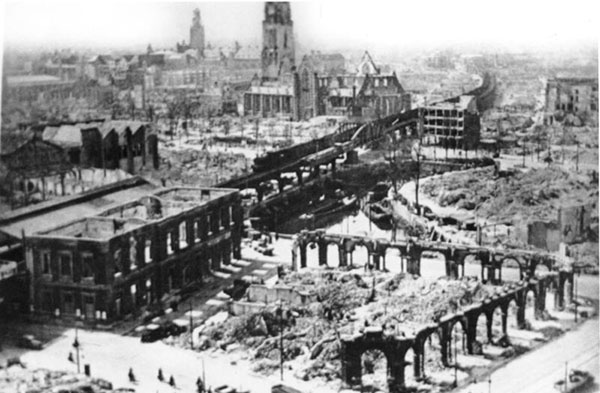
The city center of Rotterdam after the bombing. Exactly one square mile of the city center was destroyed in the bombing raid, an indication of the pin-point accuracy of the bombers, which were only deployed to support the German forces on the ground right next to the bombed area.
As tragic as the bombing of Rotterdam and Warsaw was—indeed, as tragic as the entire war was—the reality remains that both strikes were in direct support of attacking ground troops, and were not strikes against civilians for the purpose of spreading terror without any military objective.
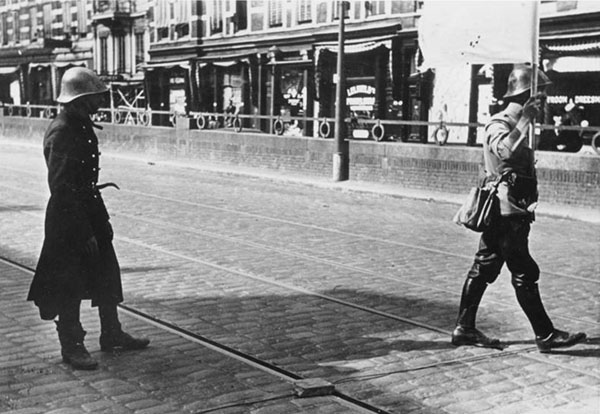
Dutch officers negotiating the surrender of Rotterdam, 1940.
It was in fact the British RAF, under the direct orders of Winston Churchill, which started the saturation bombing of civilians—on May 10, 1940, the day the new Prime Minister took office. From that day onward, British bombers bombed German civilian targets almost every night.
Even then, Hitler ordered the Luftwaffe not to respond in kind, and only to bomb military targets in Britain, such as airfields and ports, in preparation for a planned invasion of the United Kingdom.
On August 25, 1940, a German raid on an oil refinery on the banks of Thames River in east London took place as part of this tactical assault. Some of the bombs landed next to the refinery, in London’s East End, causing no casualities—but in response to this bombing, described by the post-war Official History of the Defence of the United Kingdom as “unintentional”—the first mass raid on Berlin by British bombers took place six days later.
After that, regular British raids on Berlin’s non-military targets took place—and escalated throughout the war.
Despite these attacks on Berlin, Hitler still refused to retaliate. But this situation could not last, and after nearly four months, the Luftwaffe was finally ordered to strike back.
In a speech in the Berlin Sportspalast on September 4, 1940, Hitler announced the German retaliation this way:
“Whereas German aviators and German planes fly over English soil daily, there is hardly a single Englishman who comes across the North Sea in daytime. They therefore come during the night, and as you know, release their bombs indiscriminately and without any plan on to residential areas, farmhouses and villages. Wherever they see a sign of light, a bomb is dropped on it.
For three months past, I have not ordered any answer to be given; thinking that they would stop this nonsensical behavior.
“Mr. Churchill has taken this to be a sign of our weakness.
“You will understand that we shall now give a reply, night for night, and with increasing force. We will put a stop to the game of these night-pirates, as God is our witness.”
As J.M. Spaight detailed in his book, it was the British who were to “realise the full potential” of saturation civilian bombing, and that the British bombers were designed to bomb cities, he said, while the “Teutonic mind” never even considered such a policy, and instead viewed an air force merely as a tool to “blast open” a path for attacking armies.
Spaight also wrote that Hitler’s hope that “Churchill would stop this nonsense” was “stupid” and furthermore the “blitz” on London which followed was actually minor by comparison to what had already been thrown at German cities by the RAF, and to what occurred in 1943 and 1944 (the bombing of Hamburg, Cologne, and Munich—where, Spaight boasted, the fires could be seen 150 miles away).
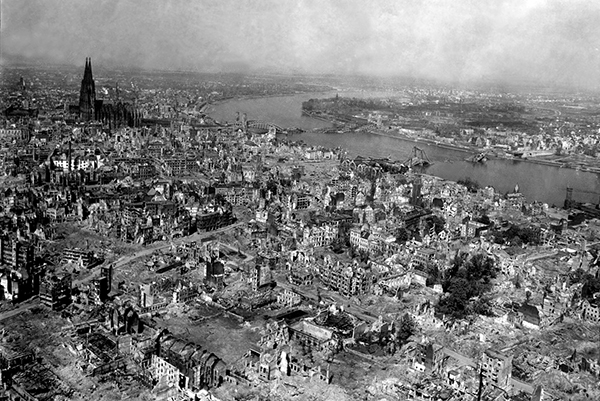
The German city of Cologne was bombed in 262 separate air raids by the Allies, starting on May 12, 1940.
Furthermore, Spaight said, the German air force was never used for anything else until ordered to retaliate against the British campaign. As Spaight put it:
“Whatever Hitler wanted or did not want, he most assuredly did not want the mutual bombing to go on. He had not wanted it ever to begin. He wanted it, having begun, to be called off. There was ample evidence that he did not want the latter kind of bombing to become the practice. He had done his best to have it banned by international agreement.”
It was therefore British policy which ultimately led to the destruction of Dresden in February 1945. The city had no military targets at all, and did not even possess a single anti-aircraft gun.
The city was filled with refugees—and even Allied prisoners of war (the most famous being the author Kurt Vonnegut, whose book Slaughterhouse-Five was based on his recollection of the bombing).
Some 700,000 incendiary bombs were dropped on Dresden, one bomb for every two inhabitants. Temperatures above ground reached up to 1,600 degrees Celsius, or 2912 degrees Fahrenheit. Unknown thousands of people—estimates vary up to 135,000 or more—were killed in the resulting firestorm, and the entire city was laid waste.
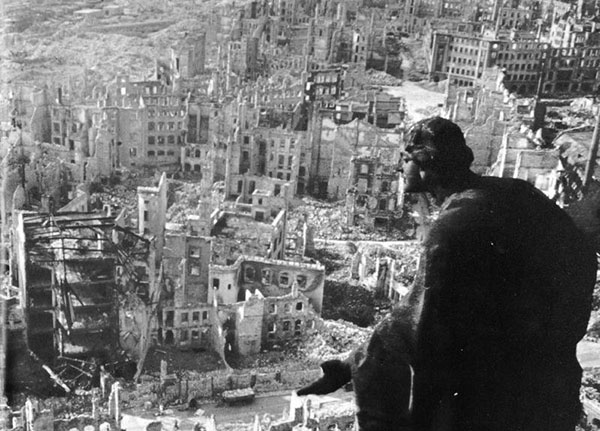
The aftermath of the bombing of Dresden.
The establishment historians are equally reticent over the role of Churchill and the RAF in the bombing of Dresden, and are always seeking reasons to excuse this war crime.
The reality is that Churchill and the RAF bomber command under Sir Arthur Harris knew very well what was going to happen and also that there was no military justification for the attack.
The truth about Churchill’s role in the destruction of Dresden was revealed in a memo held by the RAF’s Air Historical Branch, which quotes the British Prime Minister as only being interesting in how many civilian refugees he could “fry” with the attack:
“I do not want to receive any suggestions how we can destroy militarily important targets in Dresden’s hinterland, I want to get suggestions how we can fry 600,000 refugees from Breslau in Dresden.”—Winston Churchill, as quoted in a Minute by A.P.S. of S.—Air Chief Marshal Sir Wilfrid Freeman—Jan. 26, 1945 in Air Historical Branch file CMS 608.
Recommended Reading: Bombing Vindicated, by J.M. Spaight. 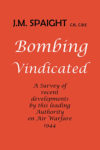
Published in 1944 by a former British Principal Secretary of the Air Ministry as a response to increasing discontent in Britain with the Allied bombing of German cities, this book set out to justify the saturation bombing of civilians.
Reflecting official British government policy, it states clearly that the idea to saturate bomb civilian targets was initiated by the British in May 1940, and that Hitler opposed this concept and refused to retaliate for months while German cities were bombed, hoping that “Churchill would come to his senses.” CLICK HERE FOR DETAILS